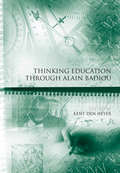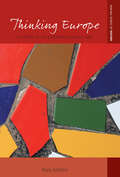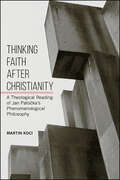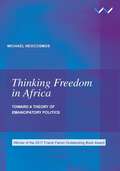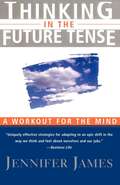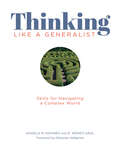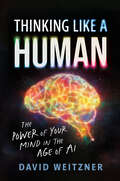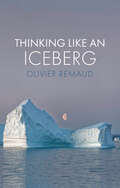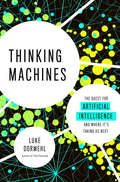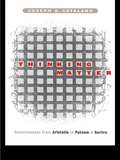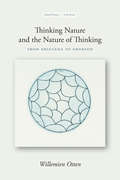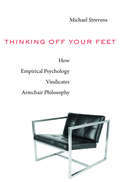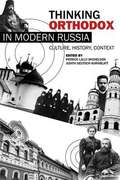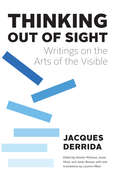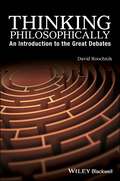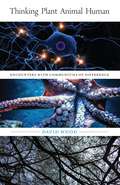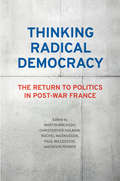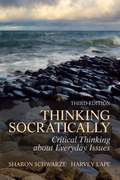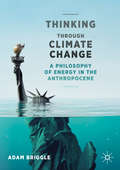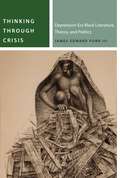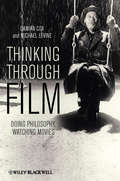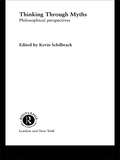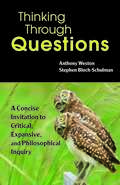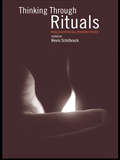- Table View
- List View
Thinking Education Through Alain Badiou (Educational Philosophy and Theory Special Issues #19)
by Kent Den HeyerThinking Education Through Alain Badiou represents the first collection to explore the educational implications of French philosopher Alain Badiou's challenge to contemporary philosophical orthodoxy put forth in his 1993 work, Ethics: An Essay on the Understanding of Evil. Represents the first collection of work in education to grapple with what Alain Badiou might mean for the enterprise of schooling Takes up Badiou's challenge to contemporary and conventional Anglo-American doxa Includes original essays by experts in several different educational fields
Thinking Europe: A History of the European Idea since 1800 (Making Sense of History #46)
by Mats AndrénPresenting a new historical narrative on European integration and identity this title examines how the concept of Europe has been entangled in a dynamic and dramatic tension between calls for unity and arguments for borders and division. Through an in-depth intellectual history of the idea of Europe, Mats Andren interrogates the concept of integration and more recent debates surrounding European identity across the nineteenth and early twentieth centuries and the post-war period. Applying a broad range of original sources this unique work will be key reading for students and researchers studying European History, European Studies, Political History and related fields.
Thinking Faith after Christianity: A Theological Reading of Jan Patočka's Phenomenological Philosophy (SUNY series in Theology and Continental Thought)
by Martin KociWinner of the 2020 Emerging Scholar’s Theological Book Prize presented by the European Society for Catholic TheologyThis book examines the work of Czech philosopher Jan Patočka from the largely neglected perspective of religion. Patočka is known primarily for his work in phenomenology and ancient Greek philosophy, and also as a civil rights activist and critic of modernity. In this book, Martin Koci shows Patočka also maintained a persistent and increasing interest in Christianity. Thinking Faith after Christianity examines the theological motifs in Patočka's work and brings his thought into discussion with recent developments in phenomenology, making a case for Patočka as a forerunner to what has become known as the theological turn in continental philosophy. Koci systematically examines his thoughts on the relationship between theology and philosophy, and his perennial struggle with the idea of crisis. For Patočka, modernity, metaphysics, and Christianity were all in different kinds of crises, and Koci demonstrates how his work responded to those crises creatively, providing new insights on theology understood as the task of thinking and living transcendence in a problematic world. It perceives the un-thought element of Christianity—what Patočka identified as its greatest resource and potential—not as a weakness, but as a credible way to ponder Christian faith and the Christian mode of existence after the proclaimed death of God and the end of metaphysics.
Thinking Freedom in Africa: Toward a theory of emancipatory politics
by Michael NeocosmosThinking Freedom in Africa conceives an emancipatory politics beginning from the axiom that ‘people think’. Previous ways of conceiving the universal emancipation of humanity have in practice ended in failure. Marxism, anti-colonial nationalism and neo-liberalism all understand the achievement of universal emancipation through a form of state politics. Marxism, which had encapsulated the idea of freedom for most of the twentieth century, was found wanting when it came to thinking emancipation because social interests and identities were understood as simply reflected in political subjectivity which could only lead to statist authoritarianism. Neo-liberalism and anti-colonial nationalism have also both assumed that freedom is realizable through the state, and have been equally authoritarian in their relations to those they have excluded on the African continent and elsewhere.Thinking Freedom in Africa then conceives emancipatory politics beginning from the axiom that ‘people think’. In other words, the idea that anyone is capable of engaging in a collective thought-practice which exceeds social place, interests and identities and which thus begins to think a politics of universal humanity. Using the work of thinkers such as Alain Badiou, Jacques Rancière, Sylvain Lazarus, Frantz Fanon and many others, along with the inventive thought of people themselves in their experiences of struggle, the author proceeds to analyse how Africans themselves – with agency of their own – have thought emancipation during various historical political sequences and to show how emancipation may be thought today in a manner appropriate to twenty-first century conditions and concerns.
Thinking How to Live
by Allan GibbardPhilosophers have long suspected that thought and discourse about what we ought to do differ in some fundamental way from statements about what is. But the difference has proved elusive, in part because the two kinds of statement look alike. Focusing on judgments that express decisions—judgments about what is to be done, all things considered—Allan Gibbard offers a compelling argument for reconsidering, and reconfiguring, the distinctions between normative and descriptive discourse—between questions of "ought" and "is." Gibbard considers how our actions, and our realities, emerge from the thousands of questions and decisions we form for ourselves. The result is a book that investigates the very nature of the questions we ask ourselves when we ask how we should live, and that clarifies the concept of "ought" by understanding the patterns of normative concepts involved in beliefs and decisions. An original and elegant work of metaethics, this book brings a new clarity and rigor to the discussion of these tangled issues, and will significantly alter the long-standing debate over "objectivity" and "factuality" in ethics.
Thinking In The Future Tense: Leadership Skills For A New Age
by Jennifer JamesExplains the changes that are taking place in the business world and offers advice on obtaining the skills not only to survive, but to prosper. These include: perspective - the ability to identify the important changes; energy - doing more with less
Thinking Like a Generalist: Skills for Navigating a Complex World
by Angela Kohnen Wendy SaulWhat can we teach kids today that will have utility ten or fifteen years from now? Angela Kohnen and Wendy Saul propose an approach to information literacy that goes beyond the teaching of discreet, easily outdated skills. Instead they use activity to help students build identities as curious individuals empowered to ask their own questions and able to navigate their information-filled world in pursuit of credible answers. A generalist is curious, open-minded, skeptical, and persistent in their quest for information. Thinking Like a Generalist: Skills for Navigating a Complex World demonstrates what it means to take a generalist stance in instruction and provides a set of teaching tools to be able to pass those skills to students'sskills that will transfer beyond the walls of the classroom. Inside you'll find the following: A thorough introduction to what it means to be a generalist, and how to develop the practices and tools that help generalists navigate the world we live inA focus on the teacher becoming a generalist and tips for modeling those practices in the classroomDetailed instructions on how to write a unit of study that emphasizes generalist literacy skills and includes an overview and examples of five different unitsHow to use the authors' read-aloud-think-aloud strategy to orient students to generalist tools and practicesThe ideas, strategies, and examples Thinking Like a Generalist will give you the tools to think like a generalist and then pass that knowledge on to your students, guiding them to become inquisitive, lifelong learners and preparing them for a future that we can't yet imagine.
Thinking Like a Human: The Power of Your Mind in the Age of AI
by David WeitznerA bright and timely book that celebrates the value of the human mind AI is at the forefront of everyone's minds: from students and artists, to CEO's and service workers. But what exactly is AI, and how does it influence our everyday lives? And more than that, what does it mean for our future? Is there a way for us to retain our "humanness" in a world ever-reliant on tech?This groundbreaking book argues that the key technology we use to make strategic, political, and ethical decisions is flawed. As we race headlong into a future where we outsource all of our problem solving to artificial intelligence, the greatest threat to humanity is not superintelligent machinery, but a lack of trust in the power of our own minds. This book offers a new way forward—what Dr. Weitzner calls "artful intelligence"—a philosophy that celebrates our humanness and can help each of us make better decisions and create a healthier relationship with the world around us.In these pages, the author walks us through how AI often fails and how that affects our lives. But readers will also meet the rockstars, inventors, and business leaders who embody artful intelligence and are changing our world for the better in an era rampant with AI malpractice—while being taught how to do the same.
Thinking Like an Iceberg
by Olivier RemaudWhen we imagine the polar regions, we see a largely lifeless world covered in snow and ice where icebergs drift listlessly through frozen waters, like solitary wanderers of the oceans floating aimlessly in total silence. But nothing could be further from the truth. This book takes us into the fascinating world of icebergs and glaciers to discover what they are really like. Through a series of historical vignettes recalling some of the most tragic and most exhilarating encounters between human beings and these gigantic pieces of matter, and through vivid descriptions of their cycles of birth and death, Olivier Remaud shows that these entities are teeming with many forms of life and that there is a deep continuity between iceberg life and human life, a complex web of reciprocal interconnections that can lead from the deadliest to the most vital. And precisely because there is this continuity, icebergs and glaciers tell us something important about life itself – namely, that it thrives in the most unexpected of places, even where there seems to be no life at all. At a time when we are increasingly aware that the melting of ice sheets, glaciers and sea ice is one of the many disastrous consequences of global warming, this beautiful meditation is a poignant reminder of the interconnectedness of all life and the fragility of the Earth’s ecosystems.
Thinking Machines: The Quest for Artificial Intelligence--and Where It's Taking Us Next
by Luke DormehlA fascinating look at Artificial Intelligence, from its humble Cold War beginnings to the dazzling future that is just around the corner.When most of us think about Artificial Intelligence, our minds go straight to cyborgs, robots, and sci-fi thrillers where machines take over the world. But the truth is that Artificial Intelligence is already among us. It exists in our smartphones, fitness trackers, and refrigerators that tell us when the milk will expire. In some ways, the future people dreamed of at the World's Fair in the 1960s is already here. We're teaching our machines how to think like humans, and they're learning at an incredible rate.In Thinking Machines, technology journalist Luke Dormehl takes you through the history of AI and how it makes up the foundations of the machines that think for us today. Furthermore, Dormehl speculates on the incredible--and possibly terrifying--future that's much closer than many would imagine. This remarkable book will invite you to marvel at what now seems commonplace and to dream about a future in which the scope of humanity may need to widen to include intelligent machines.From the Trade Paperback edition.
Thinking Matter: Consciousness from Aristotle to Putnam and Sartre
by Joseph S. CatalanoFirst published in 2000. Routledge is an imprint of Taylor & Francis, an informa company.
Thinking Nature and the Nature of Thinking: From Eriugena to Emerson (Cultural Memory in the Present)
by Willemien OttenA fresh and more capacious reading of the Western religious tradition on nature and creation, Thinking Nature and the Nature of Thinking puts medieval Irish theologian John Scottus Eriugena (810–877) into conversation with American philosopher Ralph Waldo Emerson (1803–1882). Challenging the biblical stewardship model of nature and histories of nature and religion that pit orthodoxy against the heresy of pantheism, Willemien Otten reveals a line of thought that has long made room for nature's agency as the coworker of God. Embracing in this more elusive idea of nature in a world beset by environmental crisis, she suggests, will allow us to see nature not as a victim but as an ally in a common quest for re-attunement to the divine. Putting its protagonists into further dialogue with such classic authors as Augustine, Maximus the Confessor, Friedrich Schleiermacher, and William James, her study deconstructs the idea of pantheism and paves the way for a new natural theology.
Thinking Off Your Feet: How Empirical Psychology Vindicates Armchair Philosophy
by Michael StrevensIn an original defense of armchair philosophy, Michael Strevens seeks to restore philosophy to its traditional position as an essential part of the quest for knowledge, by reshaping debates about the nature of philosophical thinking. His approach explores experimental philosophy’s methodological implications and the cognitive science of concepts.
Thinking Orthodox in Modern Russia
by Patrick Lally Michelson Judith Deutsch Kornblatt"Thinking Orthodox in Modern Russia" illuminates the significant role of Russian Orthodox thought in shaping the discourse of educated society during the imperial and early Soviet periods. Bringing together an array of scholars, this book demonstrates that Orthodox reflections on spiritual, philosophical, and aesthetic issues of the day informed much of Russia's intellectual and cultural climate. Volume editors Patrick Lally Michelson and Judith Deutsch Kornblatt provide a historical overview of Russian Orthodox thought and a critical essay on the current state of scholarship about religious thought in modern Russia. The contributors explore a wide range of topics, including Orthodox claims to a unique religious Enlightenment, contests over authority within the Russian Church, tensions between faith and reason in academic Orthodoxy, the relationship between sacraments and the self, the religious foundations of philosophical and legal categories, and the effect of Orthodox categories in the formation of Russian literature. "
Thinking Out of Sight: Writings on the Arts of the Visible (The\france Chicago Collection)
by Jacques DerridaJacques Derrida remains a leading voice of philosophy, his works still resonating today—and for more than three decades, one of the main sites of Derridean deconstruction has been the arts. Collecting nineteen texts spanning from 1979 to 2004, Thinking out of Sight brings to light Derrida’s most inventive ideas about the making of visual artworks. The book is divided into three sections. The first demonstrates Derrida’s preoccupation with visibility, image, and space. The second contains interviews and collaborations with artists on topics ranging from the politics of color to the components of painting. Finally, the book delves into Derrida’s writings on photography, video, cinema, and theater, ending with a text published just before his death about his complex relationship to his own image. With many texts appearing for the first time in English, Thinking out of Sight helps us better understand the critique of representation and visibility throughout Derrida’s work, and, most importantly, to assess the significance of his insights about art and its commentary.
Thinking Philosophically: An Introduction to the Great Debates
by David RoochnikThinking Philosophically: An Introduction to the Great Debates presents a highly accessible introduction to five of the most fundamental debates in world philosophy. Introduces five fundamental philosophical debates in a highly engaging and accessible manner that invites readers to enter the discussion themselves Features chapters that each consider a central philosophical question dialectically by exploring the conflicting approaches of different philosophers Argues that the work of philosophers like Plato and Rousseau is just as relevant today as it was in their own time Provides a structure that encourages readers to apply philosophical principles to their everyday lives
Thinking Plant Animal Human: Encounters with Communities of Difference (Posthumanities #56)
by David WoodCollected essays by a leading philosopher situating the question of the animal in the broader context of a relational ontology There is a revolution under way in our thinking about animals and, indeed, life in general, particularly in the West. The very words man, animal, and life have turned into flimsy conceptual husks—impediments to thinking about the issues in which they are embroiled. David Wood was a founding member of the early 1970s Oxford Group of philosophers promoting animal rights; he also directed Ecology Action (UK). Thinking Plant Animal Human is the first collection of this major philosopher&’s influential essays on &“animals,&” bringing together his many discussions of nonhuman life, including the classic &“Thinking with Cats.&”Exploring our connections with cats, goats, and sand crabs, Thinking Plant Animal Human introduces the idea of &“kinnibalism&” (the eating of mammals is eating our own kin), reflects on the idea of homo sapiens, and explores the place of animals both in art and in children&’s stories. Finally, and with a special focus on trees, the book delves into remarkable contemporary efforts to rescue plants from philosophical neglect and to rethink and reevaluate their status. Repeatedly bubbling to the surface is the remarkable strangeness of other forms of life, a strangeness that extends to the human. Wood shows that the best way of resisting simplistic classification is to attend to our manifold relationships with other living beings. It is not anthropocentric to focus on such relationships; they cast light in complex ways on the living communities of which we are part, and exploring them recoils profoundly on our understanding of ourselves.
Thinking Radical Democracy
by Martin Breaugh Christopher Holman Rachel Magnusson Devin Penner Paul MazzocchiThinking Radical Democracy is an introduction to nine key political thinkers who contributed to the emergence of radical democratic thought in post-war French political theory: Hannah Arendt, Maurice Merleau-Ponty, Pierre Clastres, Claude Lefort, Cornelius Castoriadis, Guy Debord, Jacques Rancière, Étienne Balibar, and Miguel Abensour.The essays in this collection connect these writers through their shared contribution to the idea that division and difference in politics can be perceived as productive, creative, and fundamentally democratic. The questions they raise regarding equality and emancipation in a democratic society will be of interest to those studying social and political thought or democratic activist movements like the Occupy movements and Idle No More.
Thinking Socratically: Critical Thinking About Everyday Issues
by Sharon Schwarze Harvey LapeThinking Socratically is a treatment of critical thinking, rather than an informal logic textbook. It emphasizes a philosophical reflection on real issues from everyday life, in order to teach students the skills of critical thinking in a commonplace context that is easy to understand and certain to be remembered.
Thinking Through Climate Change: A Philosophy of Energy in the Anthropocene (Palgrave Studies in the Future of Humanity and its Successors)
by Adam BriggleIn this creative exploration of climate change and the big questions confronting our high-energy civilization, Adam Briggle connects the history of philosophy with current events to shed light on the Anthropocene (the age of humanity). Briggle offers a framework to help us understand the many perspectives and policies on climate change. He does so through the idea that energy is a paradox: changing sameness. From this perennial philosophical mystery, he argues that a high-energy civilization is bound to create more and more paradoxes. These paradoxes run like fissures through our orthodox picture of energy as the capacity to do work and control fate. Climate change is the accumulation of these fissures and the question is whether we can sustain technoscientific control and economic growth. It may be that our world is about change radically, imploring us to start thinking heterodox thoughts.
Thinking Through Crisis: Depression-Era Black Literature, Theory, and Politics (Commonalities)
by James Edward Ford IIIWinner, 2020 William Sanders Scarborough Prize, Modern Language AssociationHonorable Mention, MSA First Book PrizeIn Thinking Through Crisis, James Edward Ford III examines the works of Richard Wright, Ida B. Wells, W. E. B. Du Bois, Zora Neale Hurston, and Langston Hughes during the 1930s in order to articulate a materialist theory of trauma. Ford highlights the dark proletariat’s emergence from the multitude apposite to white supremacist agendas. In these works, Ford argues, proletarian, modernist, and surrealist aesthetics transform fugitive slaves, sharecroppers, leased convicts, levee workers, and activist intellectuals into protagonists of anti-racist and anti-capitalist movements in the United States.Thinking Through Crisis intervenes in debates on the 1930s, radical subjectivity, and states of emergency. It will be of interest to scholars of American literature, African American literature, proletarian literature, black studies, trauma theory, and political theory.
Thinking Through Film: Doing Philosophy, Watching Movies
by Michael Levine Damian CoxAn introduction to philosophy through film, Thinking Through Film: Doing Philosophy, Watching Movies combines the exploration of fundamental philosophical issues with the experience of viewing films, and provides an engaging reading experience for undergraduate students, philosophy enthusiasts and film buffs alike. An in-depth yet accessible introduction to the philosophical issues raised by films, film spectatorship and film-making Provides 12 self-contained, close discussions of individual films from across genres Films discussed include Total Recall, Minority Report, La Promesse, Funny Games, Ikuru, The Dark Knight, Memento, AI and more Explores concepts that span epistemology, metaphysics, fate, choice, robot love, time travel, personal identity, spectacle, ethics, luck, regret, consequentialism, deontology and the philosophy of film itself A uniquely flexible resource for courses in philosophy and film that encourages student reflection, as well as being an engaging read for the film enthusiast
Thinking Through Myths: Philosophical Perspectives
by Kevin SchilbrackEight outstanding essays, from leading academics, deconstruct perennial problems of rationality, imagination and narrative to trace the influence of myth in our own beliefs, origins, and potential futures. Thinking Through Myths attempts to reconcile the opposed claims of pragmatism and beauty, calling for the acknowledgement of myths in everyday experience.
Thinking Through Questions: A Concise Invitation to Critical, Expansive, and Philosophical Inquiry
by Anthony Weston Stephen Bloch-SchulmanThinking Through Questions is an accessible and compact guide to the art of questioning, covering both the use and abuse of questions. Animated by wide-ranging and engaging exercises and examples, the book helps students deepen their understanding of how questions work and what questions do, and builds the skills needed to ask better questions. Cowritten by two of today's leading philosopher-teachers, Thinking Through Questions is specifically designed to complement, connect, and motivate today&’s standard curricula, especially for classes in critical thinking, philosophical questioning, and creative problem- solving (called here "expansive questioning"). Offering students a wide and appreciative look at questions and questioning, this small book will also appeal to faculty and students across the disciplines: in college writing courses, creativity workshops, education schools, introductions to college thinking, design thinking projects, and humanities and thinking classes. Open-ended, creative, and critically self-possessed thinking is its constant theme—what field doesn&’t need more of that?
Thinking Through Rituals: Philosophical Perspectives
by Kevin SchilbrackMany philosophical approaches today seek to overcome the division between mind and body. If such projects succeed, then thinking is not restricted to the disembodied mind, but is in some sense done through the body. From a post-Cartesian perspective, then, ritual activities that discipline the body are not just thoughtless motions, but crucial parts of the way people think.Thinking Through Rituals explores religious ritual acts and their connection to meaning and truth, belief, memory, inquiry, worldview and ethics. Drawing on philosophers such as Foucault, Merleau-Ponty and Wittgenstein, and sources from cognitive science, pragmatism and feminist theory, it provides philosophical resources for understanding religious ritual practices like the Christian Eucharistic ceremony, Hatha Yoga, sacred meditation or liturgical speech. Its essays consider a wide variety of rituals in Christianity, Judaism, Hinduism and Buddhism - including political protest rituals and gay commitment ceremonies, traditional Vedic and Yogic rites, Christian and Buddhist meditation and the Jewish Shabbat. They challenge the traditional disjunction between thought and action, showing how philosophy can help to illuminate the relationship between doing and meaning which ritual practices imply.
